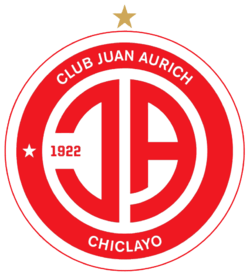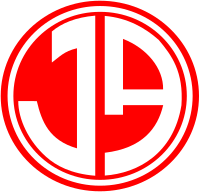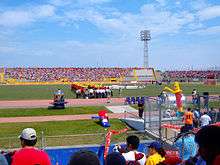Juan Aurich
Club Juan Aurich S. A., commonly known as Juan Aurich, is a professional football club based in Chiclayo, Peru. The original Juan Aurich club was founded in 1922, this incarnation however was founded in 2005; they play in the Torneo Descentralizado where they have been playing since attaining promotion when they won the 2007 Copa Perú. They play their home games at the Estadio Elías Aguirre.
 | |||
| Full name | Club Juan Aurich S. A. | ||
|---|---|---|---|
| Nickname(s) | El Ciclón del Norte (The Northern Cyclone) | ||
| Founded | (September 3, 1922[1] as the previous Juan Aurich) | ||
| Ground | Estadio Elías Aguirre, Chiclayo, Peru | ||
| Capacity | 23,000 | ||
| President | |||
| Manager | |||
| League | Liga 2 | ||
| 2019 | Liga 2, 3rd | ||
| Website | Club website | ||
|
| |||
Although the current Juan Aurich has played for only a few years in the top-flight, three other football clubs named Juan Aurich have played in the Torneo Descentralizado. The first Juan Aurich was founded in 1922 and played in the first division between 1967 and 1983 and again between 1988 and 1991. Between 1994 and 1996 the merged football club Aurich–Cañaña had a brief spell in the Primera División after they achieved promotion through the 1993 Copa Perú. Finally, a third Juan Aurich football club achieved promotion in 1997 by winning the 1997 Copa Perú. This spell in the first division lasted from 1998 to 2002.[1]
The club's first major success was won in 2007 with the promotion to the Primera División via the Copa Perú. Four years later they conquered their second major success after winning the 2011 Torneo Descentralizado, defeating Alianza Lima in the third leg of the finals in a penalty shootout.[2]
History
The club has had several restructurings since its formation in 1922.
Juan Aurich (1922–1992)
 | |
| Full name | Club Deportivo Juan Aurich |
|---|---|
| Nickname(s) | El Ciclón del Norte (The Northern Cyclone) |
| Founded | September 3, 1922[1] |
| Dissolved | 1992 |
| Ground | Estadio Elías Aguirre, Chiclayo, Peru |
The first incarnation of the football club was founded by a group of workers of the hacienda Batán Grande on 3 September 1922 as Club Deportivo Juan Aurich, after the owner of the hacienda, Juan Aurich Pastor.[1] The club played two spells in the first division (Primera División), the first between 1967 and 1983 and the second between 1988 and 1991. They dissolved shortly after losing their place in the top flight (1991 Torneo Descentralizado).
Honours
- Primera División:
- Runners-up (1): 1968
Aurich–Cañaña
 | |||
| Full name | Aurich–Cañaña | ||
|---|---|---|---|
| Founded | 1993 | ||
| Ground | Estadio Elías Aguirre, Chiclayo | ||
| Capacity | 25,000 | ||
|
| |||
Following their relegation at the end of the 1991 Torneo Descentralizado, a new football club was formed, albeit a merge, between the remaining Juan Aurich club and Deportivo Cañaña. This merged club—led by manager Horacioa Baldessari won the 1993 Copa Perú and gained promotion to 1994 Torneo Descentralizado when they defeated FBC Aurora, Unión Juventud, Deportivo Garcilaso, and Colegio Nacional Iquitos in the final group. They held a brief spell there between 1994 and 1996 until their relegation at the end of the 1996 Torneo Descentralizado season, when they were relegated to the Copa Perú.
Juan Aurich (1996–2004)
A new reincarnation of Juan Aurich was formed as Juan Aurich de Chiclayo shortly after Aurich–Cañaña was relegated; their nickname was El Ciclón del Norte (The Northern Cyclone). The new Juan Aurich achieved promotion through the 1997 Copa Perú and played from 1998 until 2002 when they were relegated. The third Juan Aurich football club achieved promotion in 1997 by winning the 1997 Copa Perú. This spell in the first division lasted from 1998 to 2002.[1] Due to the financial strain created by playing in the top flight, Juan Aurich de Chiclayo also folded as its predecessors.[1]
Honours
- Copa Perú
- Winners (1): 1997
- Liga Departamental de Lambayeque
- Winners (1): 1997
- Liga Distrital de Chiclayo
- Winners (1): 1997
Foundation and promotion
In November 2004, Juan Merino Aurich took control of the waning football club Mariscal Nieto of the La Victoria district of the Chiclayo Province. Merino converted the club to Juan Aurich de La Victoria and founded the current incarnation of Juan Aurich on 28 January 2005.[1] In 2006, they finished first in the regional stage of the 2006 Copa Perú advanced to the national stage of the tournament. They overcame their rivals in the Round of 16 and the quarter-finals but fell to Hijos de Acosvinchos in the semifinals. The following season they again reached the regional stage of the 2007 Copa Perú and finished first. This time, however, they achieved promotion to the 2008 Torneo Descentralizado by advancing to and winning the finals. Baldessari, as in 1993, led the team and defeated Sport Águila in the finals in a penalty shootout.
First seasons of professional football
Their first season in the first division was not remarkable. In the Torneo Apertura, they finished eighth and in the Torneo Clausura they finished twelfth. Consequently, the club finished twelfth on the aggregate table and tied on points with Atlético Minero, which finished thirteenth. The two teams played an extra match to determine the relegated team.[3] Juan Aurich defeated Atlético Minero 2–1 and remained in the first division.
In the 2009 Torneo Descentralizado, the club made a huge improvement with manager Franco Navarro. They finished first in the first stage of the season and were one of the favorites to reach the finals. As leading team of the first stage, they started first in their group of the second stage. However, in October, two months before the end of the season, the club and Navarro terminated the manager's contract.[4] The club hired Luis Fernando Suárez to finish coaching what was left of the season.[5] Alianza Lima, which was second of the group at the start of second stage, surpassed Juan Aurich and failed to advance to the finals. At the end of the season the club finished third on the aggregate table, qualifying for the 2010 Copa Libertadores.
The club continued with Suárez into the 2010 season, which began on a high note after they eliminated Estudiantes Tecos in the first stage of the 2010 Copa Libertadores. They advanced to Group 3 of the competition with Copa Libertadores defending champions Estudiantes de La Plata, Alianza Lima, and Bolívar. They did not advance to the following stage as they finished third behind Estudiantes and Alianza Lima. In the 2010 Torneo Descentralizado the club's performance suffered which led to Suárez's exit from the club but they managed to obtain the last berth to the 2011 Copa Sudamericana under Juan Reynoso.[6][7] In mid-2010 he became Anonymous Society.
First professional title
The following season they achieved their greatest success yet. The club started by hiring Colombian Diego Umaña after Reynoso resigned from the managing position.[8][9] Under Umaña's direction, they returned as contenders for the title and successfully reached the finals of the 2011 Torneo Descentralizado. They lost the first leg at home 1–2 against Alianza Lima and were in danger of losing the chance to win their first professional championship. Surprisingly, in the second leg they held their own against Alianza at the Estadio Alejandro Villanueva and achieved a narrow 1–0 win with a memorable goal from Ysrael Zúñiga in the second half.[10] As both teams had won a match of the finals, a third leg was forced to be played in the Estadio Nacional. A scoreless draw at the Nacional led to a penalty shootout. The final score of the shootout was 3–1 in favor of Juan Aurich.[2] They were the first club outside the Lima Region to win the Torneo Descentralizado since FBC Melgar in 1981.
Colors and badge
The original Club Deportivo Juan Aurich's colors were red and white. Both Juan Aurich de Chiclayo and Juan Aurich de La Victoria adopted the same colors and the same badge.
Stadium

Juan Aurich plays in the multi-purpose stadium Estadio Elías Aguirre which has a capacity of 25,000. Built between 1968 and 1970 by the municipality of the Chiclayo Province, it was named after the 19th century Peruvian sailor Elías Aguirre Romero. The municipality transferred administration of the stadium to the Instituto Peruano del Deporte. The stadium was renovated for the 2004 Copa América and again for the 2005 FIFA U-17 World Championship in which artificial turf was installed. The stadium is also home to many football clubs of the Chiclayo province that compete in the Ligas Distritales. In 2013, the stadium was closed for renovations in preparation for the 2013 Bolivarian Games to be held in Trujillo. Consequently, Juan Aurich has temporarily moved its home matches to the Estadio Francisco Mendoza Pizarro, located in Olmos.
Current squad
- As of 19 March 2017.[11]
Note: Flags indicate national team as defined under FIFA eligibility rules. Players may hold more than one non-FIFA nationality.
|
|
Honours
Juan Aurich has a total of three major achievements. Their first important achievement was their conquest of the Copa Perú in 1997 which led to the promotion of the club to the first division. Their most important achievement, however, was their first Primera División title won in 2011. In addition, their reserve team won the reserve league Torneo de Promoción y Reserva in 2012.
National
National cups
- Copa Federación
- Runners-up (1): 2012
Regional
- Región I
- Liga Departamental de Lambayeque
- Winners (2): 1997, 2007
- Runners-up (2): 2005, 2006
- Liga Distrital de Chiclayo
- Winners (3): 1939, 1997, 2007
Reserve team
Performance in CONMEBOL competitions
- Copa Libertadores: 4 appearances
- Copa Sudamericana: 3 appearances
- Copa Ganadores de Copa: 1 appearance
- 1971: First Stage
Notable managers
The following managers won at least one trophy when in charge of Juan Aurich or led the team to an important achievement.
| Name | Period | Achievement |
|---|---|---|
| 2007 | 1 Copa Perú | |
| Oct 29, 2008–Oct 6, 2009, July 14, 2012–Dec 21, 2012 | Qualified to Copa Libertadores | |
| Oct 12, 2009–Aug 16, 2010 | Qualified to Copa Libertadores | |
| Jan 5, 2011–July 13, 2012 | 1 Torneo Descentralizado |
Other managers








References
- Quispe, Juan. "Familia Aurich". dechalaca.com (in Spanish). Retrieved 26 July 2013.
- "¡Celebra Chiclayo! Aurich se coronó campeón del Descentralizado". depor.pe (in Spanish). 14 December 2011. Retrieved 26 July 2013.
- "Juan Aurich y Atlético Minero jugarán un partido extra para definir la baja". elcomercio.pe (in Spanish). 14 December 2008. Retrieved 26 July 2013.
- Castro, Roberto (3 October 2009). "Franco Navarro renunció intempestivamente a la dirección técnica de Juan Aurich". dechalaca.com (in Spanish). Retrieved 26 July 2013.
- "Vocean a Luis Suárez como el próximo técnico de la selección". depor.pe (in Spanish). 12 October 2009. Retrieved 26 July 2013.
- "Reynoso sobre su llegada al Aurich: "Me agradó el proyecto"". depor.pe (in Spanish). Retrieved 26 July 2013.
- "Luis Suárez dejó de ser técnico de Juan Aurich". depor.pe (in Spanish). Retrieved 26 July 2013.
- "Diego Umaña es nuevo técnico del Juan Aurich". peru.com (in Spanish). Archived from the original on 10 January 2011. Retrieved 26 July 2013.
- "Se cansó de las 'mecidas': Reynoso renunció al Juan Aurich". depor.pe (in Spanish). 30 December 2010. Retrieved 26 July 2013.
- "Habrá tercer partido: Aurich venció 1-0 a Alianza en Matute". elcomercio.pe (in Spanish). 11 December 2011. Retrieved 26 July 2013.
- "Plantilla Juan Aurich 2012". Juan Aurich. Retrieved 9 February 2012.